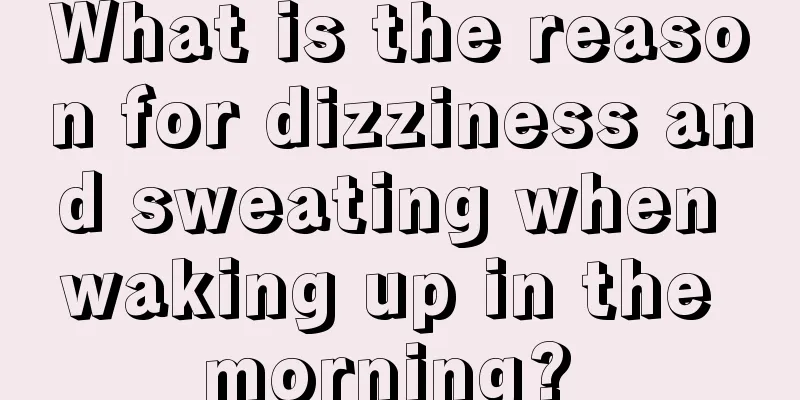What is the reason for dizziness and sweating when waking up in the morning?

|
If you get up in the morning and feel dizzy and sweating, you need to pay attention to whether it is physiological or pathological night sweats. If it is pathological night sweats, treatment is required. These symptoms are common in people with low blood calcium, diabetes, or tracheal diseases. 1. Physiological night sweats: In childhood, the skin is very tender, contains more water, has abundant capillaries, has active metabolism, and the autonomic nervous system regulation function is not yet perfect, so it is easy to sweat during activities. If children are too active before going to bed, the metabolism of various organs in the body will be active, which can increase the body's heat production. During sleep, the blood vessels in the skin will dilate, the sweat glands will secrete more, and the child will sweat profusely to help dissipate heat. Secondly, eating before going to bed can enhance gastrointestinal motility, increase gastric juice secretion, and increase sweat gland secretion, which can cause children to sweat more after falling asleep, especially within the first 2 hours of falling asleep. In addition, if the indoor temperature is too high, or the quilt is too thick, or electric blanket is used, it can cause profuse sweating during sleep. 2. Pathological night sweats: Some people sweat mainly in the first half of the night after falling asleep, which is often caused by low blood calcium. Low calcium can easily increase the excitability of the sympathetic nerves, just like turning on the "faucet" of the sweat glands. This situation is particularly common in children with rickets. However, night sweats are not a unique symptom of rickets. A comprehensive analysis should be conducted based on the child's feeding conditions, outdoor activities, etc. Blood calcium, blood phosphorus and wrist bone X-rays should also be checked to determine whether the child has active rickets. 3. Middle ear and inner ear diseases: Different ear problems can cause dizziness, such as otitis media, Meniere's disease, etc. Common cold viruses can also invade the inner ear and cause problems, and even lead to vomiting. 4. Drug influence: Some antihypertensive drugs, heart and diabetes drugs, and even cold sensitivity drugs may have this side effect. 5. Chronic diseases: If diabetes, bronchial disease, kidney disease, etc. are not well controlled, the above situation (such as low blood sugar) may also occur. 6. Arrhythmia: Heart disease causes abnormal oxygen supply to the brain and causes dizziness, among which slow heartbeat has a greater impact. |
>>: Which type of jasmine tea is best?
Recommend
What are the dangers of ovarian tumors
Ovarian tumor is a common malignant tumor in wome...
Can liposuction be performed on the eyes?
I believe everyone wants to have bright big eyes,...
3 issues that lung cancer patients should consider during chemotherapy
The importance of chemotherapy as a systemic trea...
What to do if sensitive skin is allergic
Nowadays, many people who love beauty have the ha...
How to distinguish the early and late symptoms of bladder cancer?
Bladder cancer is a common urinary system cancer....
How to reduce fever caused by inflammation?
In daily life, inflammation in the body can easil...
What should I do if the zipper of my bag is difficult to pull?
People usually use all kinds of bags, such as sch...
What to do if cystitis and bleeding occur during radiotherapy for cervical cancer
It is a common clinical phenomenon that cervical ...
What is the disease of chest tightness and shortness of breath after meals
Chest tightness and shortness of breath after mea...
How long does it take for gallbladder cancer to recur after surgery
What are the treatments for recurrence of gallbla...
Nursing and health care after surgical treatment of bladder cancer
The treatment of bladder cancer is mainly surgica...
What should you pay attention to during the confinement period
The short confinement period is different from th...
What should a pregnant woman do if she wants to eat spicy hot pot?
In the southwest of our country, people especiall...
The correct way to do chest expansion exercise
Before exercising, in order to allow your muscles...
What are the items for lung cancer examination? More examinations
There are many items for lung cancer examination,...









